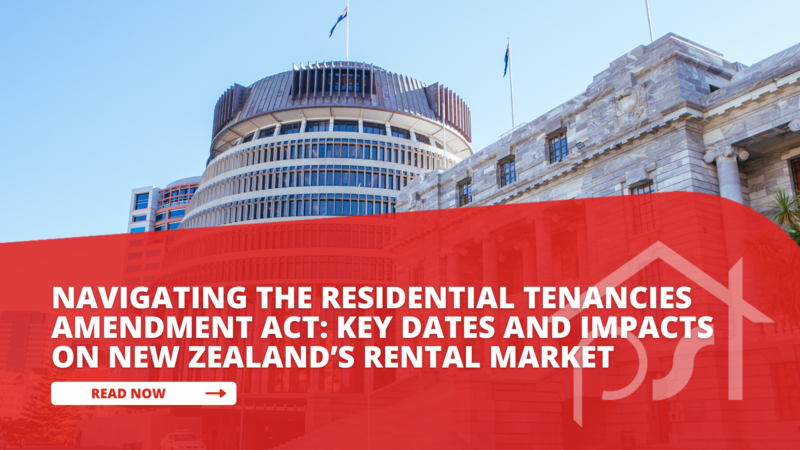Navigating the Residential Tenancies Amendment Act: Key Dates and Impacts on New Zealand’s Rental Market

Understanding the Amendment Act
Key Features of the Act
The Residential Tenancies Amendment Act introduces significant reforms impacting both landlords and tenants in New Zealand. Key features include changes to tenancy terminations, enabling landlords to end periodic tenancies with 90 days’ notice without a specific reason. This reinstates a “no cause” termination provision, offering landlords greater flexibility. Additionally, provisions allowing for online bond lodgement are introduced, streamlining processes and reducing administrative burdens. Changes also affect fixed-term tenancies, which will automatically convert to periodic unless otherwise noted.
Moreover, the Act introduces pet consent rules, allowing landlords to charge a pet bond and establish clear guidelines for pet-related responsibilities. These updates aim to balance tenant rights with landlord obligations, fostering a fairer rental environment. For landlords and property managers, understanding these features is crucial for compliance and effective property management.
Timeline for Implementation
The timeline for the implementation of the Residential Tenancies Amendment Act is structured to ensure a gradual transition for all parties involved. The provisions for online bond lodgement took effect on 17 December 2024, revolutionizing how bonds are managed by moving processes online. Following this, changes to tenancy terminations, including the reintroduction of “no cause” terminations, are set to commence on 30 January 2025. These changes grant landlords the ability to end periodic tenancies more flexibly.
Technical changes, such as modernized notice delivery methods, will be implemented on 20 March 2025, enhancing communication efficiency between landlords and tenants. Pet-related provisions, involving new consent rules and the ability to charge a pet bond, are expected to come into force later in 2025, with the exact date to be confirmed by Order in Council.
Impacts on the Rental Market
Impact on Landlords
The Residential Tenancies Amendment Act significantly affects landlord obligations, offering both challenges and opportunities. The reintroduction of “no cause” terminations provides landlords with increased flexibility, allowing them to end periodic tenancies with 90 days’ notice without needing specific reasons. This change can help landlords manage their properties more effectively and mitigate potential risks associated with difficult tenancies.
Furthermore, the ability to charge a pet bond, up to a maximum of two weeks’ rent, offers financial protection against pet-related damages. However, landlords must adhere to the new pet consent rules, which require written consent and reasonable grounds for refusal.
Online bond lodgement aims to streamline administrative tasks, reducing paperwork and enhancing efficiency. Landlords must stay informed and adapt their processes to comply with these changes, ensuring they remain competitive and compliant in New Zealand’s dynamic rental market. Understanding these impacts is crucial for effective property management and maintaining successful landlord-tenant relationships.
Impact on Tenants
The Residential Tenancies Amendment Act introduces several changes that enhance tenant rights, providing a more balanced framework in the rental market. The reduced notice period for ending a periodic tenancy from 28 to 21 days gives tenants greater flexibility in managing their living arrangements. Additionally, the pet consent rules create opportunities for tenants to keep pets in rental properties, subject to landlord approval and potential pet bonds. This change addresses a common tenant concern, promoting pet-friendly housing options.
Moreover, provisions preventing retaliatory termination ensure that tenants exercising their rights are protected from unjust eviction. These changes empower tenants, fostering a more secure and tenant-friendly environment. However, tenants must be aware of their responsibilities, particularly regarding pet-related damages, which remain their liability beyond fair wear and tear. Overall, these updates aim to create a fairer rental market, emphasizing tenant rights while maintaining a balance with landlord duties.
Preparing for Compliance
Landlord Obligations
To ensure compliance with the Residential Tenancies Amendment Act, landlords must update their practices to reflect new obligations. Key among these is the proper implementation of tenancy termination procedures. Landlords must understand the conditions under which they can issue “no cause” terminations and be prepared to provide adequate notice as stipulated.
Additionally, landlords should familiarize themselves with the new online bond lodgement process, which requires bonds to be lodged digitally. This change necessitates adopting new tools or platforms to facilitate seamless transactions.
For properties allowing pets, landlords must clearly outline pet-related policies in tenancy agreements, including potential pet bonds and any reasonable conditions for pet ownership. Lastly, landlords are obligated to respect tenant rights, ensuring that all terminations and notices are compliant with the Act’s provisions. Proactive engagement with these obligations will help landlords maintain positive relationships with tenants and avoid potential legal disputes.
Tenant Rights and Responsibilities
Under the Residential Tenancies Amendment Act, tenants gain enhanced rights, but they must also be aware of their responsibilities to ensure compliance. Tenants are now afforded greater protection against retaliatory terminations, meaning landlords cannot lawfully end a tenancy simply because tenants exercise their rights, such as requesting necessary repairs. This fosters a more secure living environment.
Tenants interested in keeping pets must secure written consent from their landlord and may be required to pay a pet bond. It is crucial for tenants to understand the terms related to pet ownership, including restrictions and potential financial liabilities for damages beyond ordinary wear and tear.
Moreover, tenants are responsible for adhering to new notice periods when ending a tenancy and should be prepared to comply with the streamlined processes for bond refunds. By staying informed about their rights and fulfilling their responsibilities, tenants can contribute to a harmonious rental experience while safeguarding their interests.
